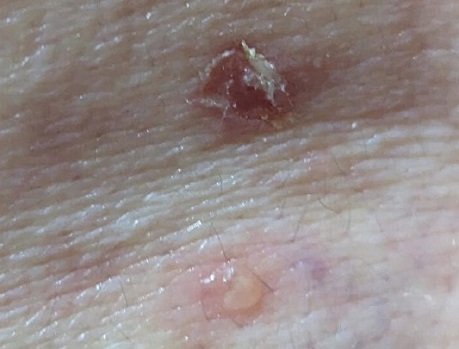Nikhil Prasad Fact checked by:Thailand Medical News Team Feb 18, 2024 1 year, 10 months, 2 days, 22 hours, 52 minutes ago
COVID-19 News: The COVID-19 pandemic has not only posed significant challenges to global public health but has also raised intriguing questions about its potential impact on various bodily systems, including the skin and immune system. Amidst the myriad manifestations of this novel coronavirus, emerging evidence suggests a possible link between COVID-19 and the development of autoimmune diseases, particularly pemphigus. In this
COVID-19 News report, we delve into a detailed examination of this association, drawing from a compelling case study by doctors from University of Toronto-Canada and the Ottawa Hospital, University of Ottawa-Canada, and explore the underlying mechanisms.
 COVID-19 Can Lead To New Onset Of Pemphigus
Introduction to Pemphigus-Understanding the Autoimmune Landscape
COVID-19 Can Lead To New Onset Of Pemphigus
Introduction to Pemphigus-Understanding the Autoimmune Landscape
Pemphigus encompasses a diverse group of mucocutaneous autoimmune bullous diseases characterized by antibody-mediated acantholysis, resulting in blister formation and erosions on the skin and mucous membranes. Among its subtypes, pemphigus vulgaris (PV) is the most prevalent, primarily targeting desmosomal complexes such as desmoglein and desmocollin. While the clinical presentation of pemphigus typically involves blistering and erosions, distinguishing features may vary depending on the subtype. Notably, paraneoplastic pemphigus (PNP) stands out due to its association with malignancies and a poorer prognosis compared to other subtypes.
Thailand
Medical News had previously warned about COVID-19 also causing what is known as oral pemphigus in the post COVID phase.
https://www.thailandmedical.news/news/breaking-covid-19-news-indonesian-researchers-warn-that-sars-cov-2-infections-can-lead-to-oral-pemphigus-vulgaris-in-post-covid-phase
Unraveling the COVID-19 Connection: A Case Report
Against the backdrop of the COVID-19 pandemic, the medical community has observed sporadic cases linking COVID-19 infection to the onset of pemphigus. A compelling case study involving a 73-year-old female underscores this intriguing association. The patient developed symptoms of pemphigus, including blistering eruptions, merely two weeks after testing positive for COVID-19. Despite lacking a prior history of dermatologic or autoimmune conditions, she presented with clinical and histological features consistent with pemphigus, raising questions about the potential role of COVID-19 in triggering autoimmune responses.
Exploring Mechanisms: Viral Triggers and Autoimmunity
Viruses have long been implicated as triggers of autoimmune diseases, and SARS-CoV-2, the virus responsible for COVID-19, appears to be no exception. Studies have proposed various mechanisms underlying the potential link between COVID-19 and autoimmune phenomena. One such mechanism involves mole
cular mimicry, wherein viral elements bear resemblance to human proteins, leading to the production of autoantibodies in susceptible individuals. Additionally, the hyperactivation of the immune system induced by COVID-19, characterized by the release of pro-inflammatory cytokines, may create a conducive environment for autoimmune pathogenesis.
Insights from the Case Study: Pemphigus with a Twist
Intriguingly, the case study presented herein adds a novel dimension to our understanding of pemphigus in the context of COVID-19. While the patient exhibited histological features consistent with PV, notable characteristics suggestive of PNP were also observed, representing a diagnostic challenge. This hybrid presentation, characterized by enhanced basement membrane staining, prompts a reevaluation of the underlying mechanisms and highlights the complexity of autoimmune responses triggered by COVID-19.
A number of past cases reports and studies have also validated that COVID-19 can lead to new onset of pemphigus.
https://www.cureus.com/articles/127261-pemphigus-vulgaris-possibly-associated-with-covid-19-infection#!/
https://linkinghub.elsevier.com/retrieve/pii/S0190962222008039
https://onlinelibrary.wiley.com/doi/10.1111/jdv.19271
https://www.sciencedirect.com/science/article/pii/S0738081X21000079?via%3Dihub
https://www.mdpi.com/2077-0383/11/14/3968
https://link.springer.com/article/10.1007/s42399-021-00971-8
https://jofskin.org/index.php/skin/article/view/1338
Implications and Future Directions: Navigating Diagnostic and Therapeutic Challenges
The emergence of COVID-19-associated pemphigus poses significant diagnostic and therapeutic challenges for clinicians. The overlap in clinical presentations between pemphigus subtypes and the potential for atypical manifestations underscore the importance of a comprehensive diagnostic approach, including histological examination and serological testing. Furthermore, the management of COVID-19-induced pemphigus necessitates tailored immunosuppressive therapy, considering both the severity of cutaneous involvement and the underlying immune dysregulation.
Conclusion: Towards a Holistic Approach
As the COVID-19 pandemic continues to unfold, further research is warranted to elucidate the intricate interplay between viral infections and autoimmune diseases, such as pemphigus. The case study discussed herein serves as a poignant reminder of the multifaceted nature of autoimmune responses and underscores the need for a holistic approach to patient care, encompassing both viral containment strategies and personalized immunomodulatory therapies. By unraveling the complexities of COVID-19-induced pemphigus, we strive towards enhancing our understanding of autoimmune pathogenesis and optimizing patient outcomes in the face of unprecedented medical challenges.
The case report was published in the peer reviewed journal: Sage Open Medical Case Reports.
https://journals.sagepub.com/doi/full/10.1177/2050313X241231423
For the latest
COVID-19 News, keep on logging to Thailand Medical News.
Read Also:
https://www.thailandmedical.news/news/breaking-covid-19-news-miami-murine-study-finds-that-sars-cov-2-initiates-cellular-changes-that-leads-to-devastating-skin-alterations-in-the-long-term
